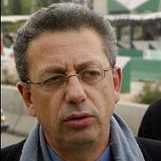Azerbaijan, Baku, Dec. 15 / Trend U. Sadikhova /
Hamas's readiness to adopt not Sharia law, but rather a democratic system could positively influence inter-Palestinian reconciliation, Palestinian Legislative Council Member Moustapha Barghouti said.
But creating a democratic system of governance on Palestinian territories must happen not only on the Hamas-controlled Gaza strip, but also on the West Bank and in Jerusalem, National Palestinian Initiative movement leader Barghouti told Trend over the phone.
Addressing numerous people in the Gaza Monday on the occasion of the the Hamas Islamic Resistance Movement's twenty-second anniversary, leader Ismail Hania stressed the need to establish a united Palestinian government and develop a national salvation program, the Al Jazeera Web site.
Hania denied FATAH accusations in the West Bank that Hamas strives to create an Islamic emirate in Gaza with Sharia law.
The leader called on the Fatah government in the West Bank to rebuild Palestinian bodies, so they do not serve Israeli interests and return the Palestinian issue to the forefront of Middle East politics.
But Barghouti participated in the talks on national reconciliation between Hamas and Fatah in Cairo.
Though Hamas's refusal from Sharia law is positive for Palestinian unity, these movements are not ready to sign an agreement.
"Unfortunately, Hamas and FATAH are not ready for national reconciliation. S, the split remains. If they want a democratic system of governance, this can be achieved soon,"he said.
Barghouti noted that one should not speak about democracy only in Gaza or West Bank. This refers to all of Palestine, including Jerusalem, he said, stressing the need to hold elections to the National Meeting of Palestine Liberation Organization. The organization has been formed without elections for the past 20 years.
"Democracy concerns not only Hamas, but FATAH and all the rest," Barghouti said.
He added that there are two easons. The agreement on reconciliation has not been concluded up until now as a result. First, the sides are not ready to approve the Egypt document on Palestinian unity. Second, the internal Palestinian split is beneficial for some countries.
"The reforms must cover both Hamas and FATAH," Barghouti said.
The process of national reconciliation was suspended in late October after Hamas refused to sign the Egyptian document on reconciliation, which was approved by FATAH.
The reconciliation plan was developed by Egyptian mediators, who called for Palestinians from the Gaza Strip and West Bank to form a national, united government and fix a date for general elections. Hamas and FATAH have different positions in this regards. Fatah intends to hold parliamentary and presidential elections together in 2010, Hamas also insists that the term of Mahmoud Abbas's authorities as the head of the Palestinian Authority expires in January 2010.
It was planned for all Palestinian factions to sign a document on reconciliation Oct. 26 during a solemn ceremony in Cairo with the participation of official representatives of Arab countries. However, Hamas has refused to sign the document after a report on the investigation of the war in Gaza was postponed in the U.N. Human Rights Council. In the report, Israel is accused of crimes against the Palestinians.
According to Hamas, the head of the Palestinian Authority and FATAH leader Mahmoud Abbas have taken this action under the U.S. and Israeli pressure, RIA Novosti reported.
Do you have any feedback? Contact our journalist at: [email protected]






